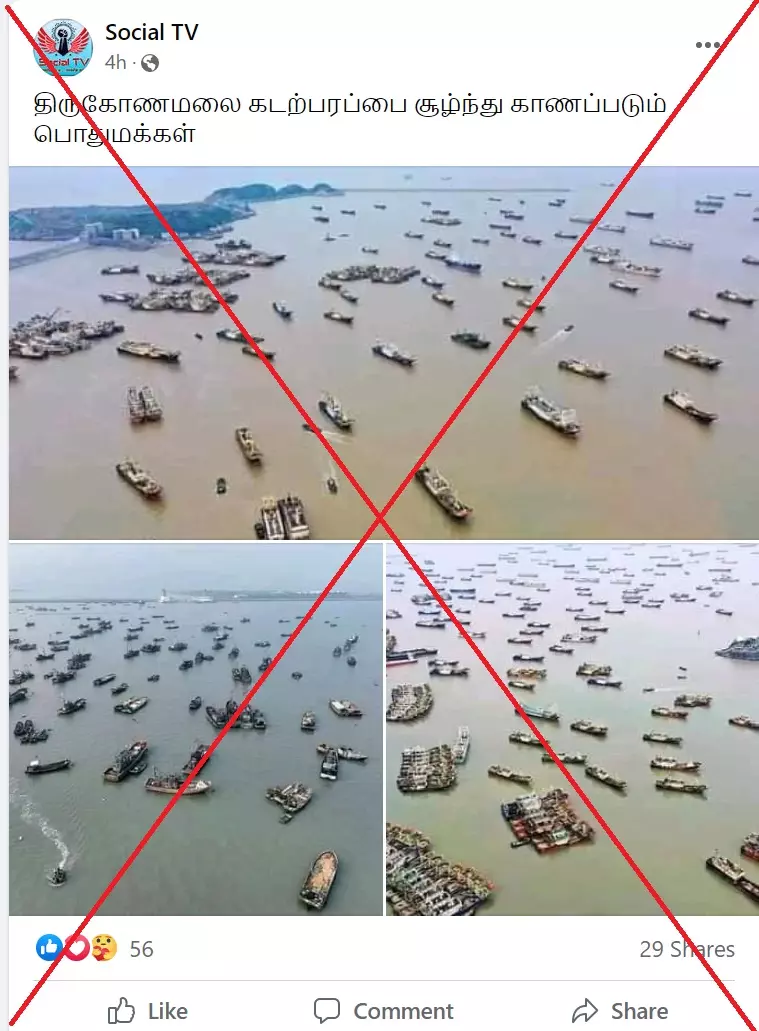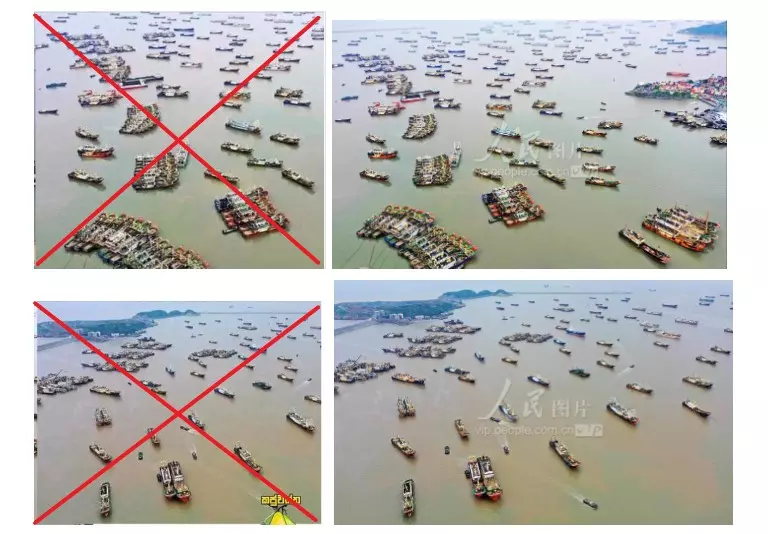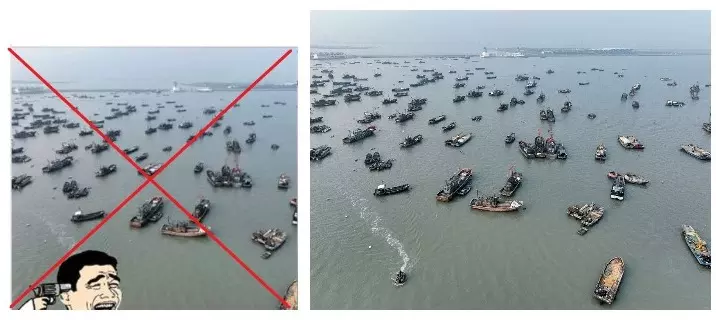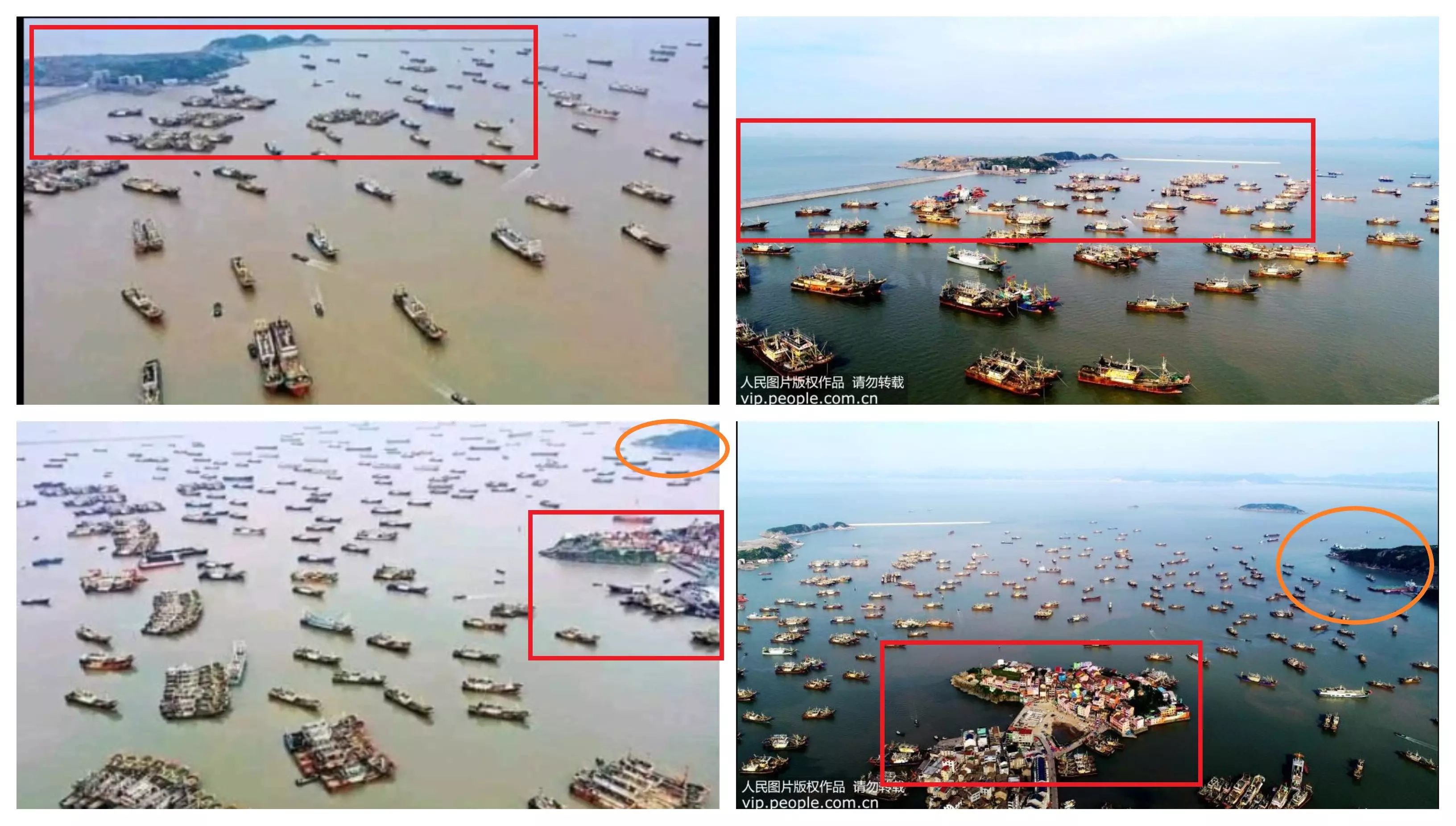As rumours spread that Sri Lanka's former prime minister was holed up at a navy base after he was forced to resign over the island's crippling economic crisis, Facebook posts shared thousands of times showed photos of a flotilla of boats that purportedly surrounded the area to stop him leaving the country. However, the photos actually show fishing boats in eastern China's Zhejiang province.
"People surrounding the eastern coastline in Trincomalee," reads a Tamil-language Facebook post shared on May 10.
The post, shared on a Facebook page with more than 100,000 followers, shows several photos of fleets of boats.
Mahinda Rajapaksa, the president's brother, resigned as Sri Lanka's prime minister on May 9 after his supporters attacked anti-government demonstrators who had been protesting peacefully for weeks.
After he was evacuated from his official residence by the military, rumours swirled that he had sought refuge at a navy base in the eastern city of Trincomalee. Sri Lanka's defence secretary later confirmed he was indeed staying there "for his safety", local media reported.
A court banned Rajapaksa and more than a dozen allies from leaving the country after ordering an investigation into the violence.
The country of 22 million people is in its worst economic crisis since independence with severe shortages of food, fuel and medicines and long power cuts.
 Screenshot of the Facebook post captured on May 11, 2022
Screenshot of the Facebook post captured on May 11, 2022 The photos were shared more than 2,500 times in similar Facebook posts here and here.
Some social media users appeared to believe the photos showed boats gathered to stop Rajapaksa leaving the country.
"Excellent, well done boys! Don't let the Rajapaksa thieves escape," one comment read.
Another wrote, "Be safe boys. More strength to you. Don't let them leave."
However, the images actually show fishing boats in China's eastern Zhejiang province.
Chinese fishing boats
Reverse image searches found three of the images shared in the misleading posts published in an article by Chinese state-run newspaper People's Daily on April 30, 2022.
The simplified Chinese headline reads: "Wenling, Zhejiang: A thousand sails enter the port as the moratorium on fishing begins."
Wenling is a county-level city in southeastern China's Zhejiang province.
"On April 30, 2022, the central Ruoshan fishing port of Wenling city in Zhejiang Province was filled with fishing boats that returned as the moratorium on marine fishing begins," the article reads.
China enforces a fishing ban every summer in key marine areas to prevent overfishing.
Below is a comparison of the images in the misleading posts (left) and the People's Daily photos (right):
 Comparison of the images in the misleading posts (L) and the People's Daily photos (R)
Comparison of the images in the misleading posts (L) and the People's Daily photos (R) Another image in the misleading posts was shared in a Facebook post about fishing boats in Taizhou city.
Taizhou is a larger city in Zhejiang that encompasses Wenling.
The photo is part of an album shared by China Radio International's (CRI) Sinhala service on May 10, 2022, which is captioned in Sinhala: "Recently, fishing activities were suspended in China for about four and a half months. About 2,144 fishing boats that resumed their operations were seen returning to the port in Taizhou city in Zhejiang province, one by one."
Below is a comparison of the image in the misleading posts (left) and the photo posted by CRI (right):
 Comparison of the image in the misleading posts (L) and the photo posted by CRI (R)
Comparison of the image in the misleading posts (L) and the photo posted by CRI (R) Similar scenes can be seen at the beginning of a video report by a local broadcaster Taizhou Yixian on May 1, 2022 about the summer fishing ban.
People's Daily posted similar photos in May 2019 in a news report about the start of the summer fishing ban in Wenling.
Below is a screenshot comparison of the photos in the misleading posts (left) and those posted by People's Daily in 2019 (right), with corresponding features marked out by AFP:
 Screenshot comparison of the photos in the misleading posts (L) and those posted by People's Daily in 2019 (R), with corresponding features marked out by AFP
Screenshot comparison of the photos in the misleading posts (L) and those posted by People's Daily in 2019 (R), with corresponding features marked out by AFP AFP has debunked a wave of misinformation around Sri Lanka's economic crisis.
(Except for the headline, this story has not been edited by BOOM staff and is published from a syndicated feed.)